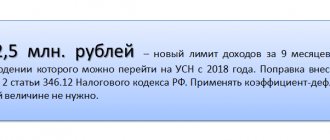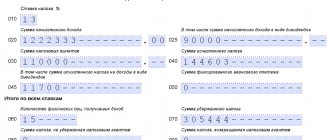Who is entitled to a deduction and in what amount?
The child deduction is a standard deduction, and paragraph 1 of Article 218 of the Tax Code of the Russian Federation is devoted to it.
The “children’s” deduction is due to the following persons who support the child: a parent (including an adopted one), his or her spouse, an adoptive parent, a guardian and a trustee. Calculate salary and personal income tax with standard deductions in the web service
The “children’s” deduction is provided for all children, without exception, under the age of 18, as well as for full-time students, graduate students, residents, interns, students and cadets under the age of 24. The amount of the deduction depends on the type of child in the family. For the first and second child, the deduction amount is 1,400 rubles each. per month. For the third and each subsequent child - 3,000 rubles. per month. When establishing the priority, it is necessary to take into account children from previous marriages, if they live in a new family, or alimony is transferred to them (see “When providing a “children’s” deduction, the total number of children, including the children of the spouse from the first marriage”). Let us add that the indicated deduction values are the same for everyone who is entitled to them. Comments on some “atypical” situations are given in Table 1.
Table 1
Explanations from officials on “children’s” deductions in unusual situations
| Situation | Comment from the Russian Ministry of Finance |
| The father has a child from his first marriage who is over 18 years old and lives with his mother | When determining the total number of children, a child from his first marriage is taken into account by the father, but not taken into account by his new wife (letter dated January 21, 2016 No. 03-04-05/1999) |
| Husband pays child support from first marriage | The current spouse has the right to receive a deduction for this child (letter dated 03/18/15 No. 03-04-05/14392) |
| The deduction for the first and second child is not provided due to their age | The deduction for the third child is 3,000 rubles. (letter dated 04/17/14 No. 03-04-05/17619) |
| A full-time student under the age of 24 got married | The parent loses the right to deduction (letter dated 03/31/14 No. 03-04-06/14217) |
| The child is registered at an address different from the parents' address | The right to deduction remains (letter dated 05/11/12 No. 03-04-05/8-629) |
| Twins were born into the family | Their order can be determined in any order (letter dated 12/21/11 No. 03-04-05/8-1075) |
| The wife's children from her first marriage live with their mother and her new husband, who did not adopt them | The current husband has the right to receive a deduction for these children (letter dated 09/05/12 No. 03-04-05/8-1064) |
In addition, a separate deduction is provided for a disabled child. It is provided for children with disabilities under the age of 18. It is also provided for full-time students, graduate students, residents, interns and students under the age of 24, if they are disabled people of group I or II. The size of the deduction depends on who receives it. If this is a parent, his spouse, or an adoptive parent, then the deduction is 12,000 rubles. per month for one child. For an adoptive parent, his or her spouse, caregiver and guardian, the deduction is RUB 6,000. per month.
What laws should you learn about your rights?
Providing a tax deduction for persons raising their child or several children alone often becomes additional assistance from a financial point of view. However, such a deduction is possible only if the parent who plans to apply for it is officially employed. Otherwise, you can’t count on help from the state.
In order for this issue to be regulated with maximum care and detail, the legislator introduced several major regulations, namely:
- Tax Code , which acts as the main regulator of all issues related to the receipt by all employed citizens of the Russian Federation of tax benefits in the form of tax deductions;
- Labor Code of the Russian Federation , which regulates the procedure for interaction between an employee and his employer on all major issues, among which receiving a tax deduction is no exception;
- Federal Law No. 81-FZ of May 19, 1995 , which regulates the procedure for assigning various state benefits to citizens who have children;
- Order of the Ministry of Health and Social Development of the Russian Federation No. 1012 of December 23, 2009 “On approval of the procedure and conditions for the appointment and payment of state benefits to citizens with children.”
The listed regulations closely regulate the provision of various types of benefits and privileges to citizens raising minor children alone, including the procedure for such citizens to receive tax benefits in the form of an increased tax deduction.
Is it necessary to give two deductions at once for a disabled child?
From the text of Article 218 of the Tax Code of the Russian Federation, we can conclude that a disabled child is entitled to two “children’s” deductions at once. The first - as for any other child (1,400 rubles or 3,000 rubles, depending on the order of birth), the second - as for a disabled person (6,000 rubles or 12,000 rubles, depending on who receives). However, there is no direct answer to the question of whether it is necessary to give both deductions at the same time.
Specialists from the Ministry of Finance of Russia agree with this position (letter dated November 7, 2019 No. 03-04-05/85821; see “One of the children in the family is disabled: how to calculate the standard deduction for personal income tax?”).
The judges are of the same opinion. The review released by the Presidium of the Supreme Court of the Russian Federation on October 21, 2015 states that the amount of deductions for a disabled child is being added (read more about this in the article “The Supreme Court of the Russian Federation summarized the practice on disputes about personal income tax: what court conclusions should accountants and employees know about” ). This means that if a child with a disability is, for example, the second in the family, then his parent has the right to receive a monthly deduction in the amount of 13,400 rubles (1,400 + 12,000).
For what period should the “children’s” deduction be provided?
The Tax Code clearly states that “children’s” deductions are provided up to the month in which the employee’s income, calculated cumulatively from the beginning of the year, exceeded 350,000 rubles. Please note that income does not include dividends, as well as payments exempt from personal income tax (letter of the Ministry of Finance of Russia dated March 21, 2013 No. 03-04-06/8872, see “When determining the maximum amount of income in respect of which a child deduction is granted , payments exempt from personal income tax are not taken into account"). Also, daily allowances, amounts of financial assistance and additional contributions to a funded pension are not taken into account (letter of the Federal Tax Service dated 08/09/19 No. SD-4-11 / [email protected] ; see “Standard deductions for personal income tax “for children”: are daily allowances and financial assistance taken into account when calculating the employee’s income limit?”).
Starting from the month in which the milestone is 350,000 rubles. passed, deductions for the child are canceled.
Let's give an example. Let’s say the monthly salary of an employee with children is 55,000 rubles. Then in the first half of the year his income will be equal to 330,000 rubles (55,000 rubles × 6 months). This means that in the period from January to June inclusive, the accountant will provide him with “children’s” deductions. In July, income will reach 385,000 rubles (55,000 rubles × 7 months). Therefore, in July and subsequent months of the year, deductions for children will not be provided.
Another reason for canceling the deduction is when the child reaches the age of 18. For older children in full-time education, there are two reasons: either completing their studies or reaching the age of 24. Experts from the Ministry of Finance explained: the right to deduction remains until the end of the year in which the child turns 18 years old. For full-time students, the same rule sounds like this: the right to deduction remains until the end of the year in which the child turns 24 years old, if training has not yet been completed. As soon as studies are completed, regardless of age, deductions stop (letter dated October 22, 2014 No. 03-04-05/53291; “The Ministry of Finance explained for what period the standard personal income tax deduction for children is provided”).
The question may also arise: for what period should a child deduction be provided if the employee applies for it in the middle of the year? Simply put, is it necessary to give a deduction for January and February if the employee applied for a deduction in March? The answer is contained in Article 218 of the Tax Code of the Russian Federation. It says that the deduction is due from the month of birth of the child, or from the month in which the adoption took place, guardianship (trusteeship) was established, or the child was placed in foster care. There are no additional conditions regarding the moment of applying for a deduction in the Code. Therefore, in case of a late application, the accountant must give a deduction retroactively. The Federal Tax Service for Moscow also agrees with this approach (letter dated December 26, 2017 No. 20-15 / [email protected] ; “Standard deduction for a child: what documents should an employee provide?”).
General rules for receiving a deduction
To apply for a tax deduction for children, the following prerequisites must be met:
1. The parent (guardian, trustee, adoptive parent, adoptive parent) must be a citizen of the Russian Federation and receive income taxed at a personal income tax rate of 13%.
The income of an individual must be subject to personal income tax. If an individual is an individual entrepreneur who applies special tax regimes, or belongs to the category of officially unemployed, or receives only state benefits, a pension, etc. as income, then, accordingly, the right to a deduction in such situations does not arise.
A free online course has been opened on “Clerk” about all other types of deductions . Sign up.
2. The presence of supported children, namely: minor children under the age of 18, children under the age of 24 who are studying full-time, disabled children under the age of 18 and disabled children of groups I, II in under 24 years of age, full-time students.
3. The cumulative amount of income from the beginning of the calendar year should not exceed 350,000 rubles. (for each parent separately), after exceeding this limit during the year, the deduction stops from the month in which the income exceeded the limit of 350,000 rubles.
Important!
- The child tax credit is provided for each calendar month from the date of eligibility.
- Deductions for children are summed up, that is, they are provided for each child separately.
- Both parents (guardians, trustees, etc.) have the same right to receive a deduction for each of their children.
Is it necessary to give a deduction for “non-income” months?
There is no clear answer to the question of whether a “children’s” deduction should be provided for months in which the employee did not have income subject to personal income tax at a rate of 13%. The Russian Ministry of Finance believes that everything depends on whether income has resumed this year. If resumed, then deductions for “non-income” months can be provided. If there is no income until December 31 inclusive, then there will be no deductions this year (letter dated October 30, 2018 No. 03-04-05/78020. See “The employee will have no income until the end of the year: is he entitled to a standard deduction according to personal income tax?").
The Federal Tax Service thinks differently. The letter dated 05.29.15 No. BS-19-11/112 states that deductions for a child for months in which there was no income are due in any case (see “Federal Tax Service: standard tax deductions for children can also be received for those months , during which the individual did not have taxable income"). A similar point of view is set out in the Resolution of the Presidium of the Supreme Arbitration Court of the Russian Federation dated July 14, 2009 No. 4431/09. In our opinion, this approach is correct, and thanks to the court’s position, it is completely safe.
Calculate “complex” wages under different remuneration systems
Periods for providing the standard child tax credit
The tax deduction for a child begins to be provided from the month:
- birth of a child;
- establishing guardianship or trusteeship over a child;
- adoption of a child.
The provision of a tax deduction for children ends in the month:
- death of a child;
- expiration of the contract under which guardianship/trusteeship was established over the child or he was transferred to a foster family;
- completion of full-time studies at an educational institution, graduate school, residency, etc.;
- the child reaches the age of majority (except for cases where the child continues full-time education, then deductions can be made until the 24th birthday).
What documents are needed for the “children’s” deduction?
Article 218 of the Tax Code of the Russian Federation stipulates that deductions for children are provided on the basis of a written application and documents confirming the right to deduction. But legislators did not provide a list of specific documents and did not indicate how often the employee must write a statement. Specialists from the Russian Ministry of Finance reported: it is enough to submit the application once, there is no need to update the application annually (letter dated 02/26/13 No. 03-04-05/8-131; see “The application for a standard tax deduction is submitted to the tax agent only once” ). A repeated application will be needed only if the employee’s circumstances for receiving the deduction have changed (letter from the Federal Tax Service of Russia for Moscow dated December 26, 2017 No. 20-15/2 [email protected] ; see “Standard deduction for a child: what documents must be provided worker?").
We have provided a list of required documents, compiled on the basis of explanations from officials, in Table 2.
table 2
What documents are needed to provide a “children’s” deduction in various situations?
| Situation | Documentation | Comment from the Russian Ministry of Finance |
| In any situation |
| letter dated 09.18.13 No. 03-04-05/38670 |
| Parents are divorced |
| letter dated 05/30/11 No. 03-04-06/1-125 |
| The parent lives with the child, but is registered at a different address | certificate from the housing and communal services about the joint residence of the child with the parent | letter dated 09.18.13 No. 03-04-05/38670 |
| A child under the age of 24 studies full-time (including at a paid university) | a certificate from the educational institution stating that the student is studying full-time | letter dated 10/02/15 No. 03-04-05/56445 |
| A child under 24 years of age is studying abroad | a certificate from the educational institution stating that the student is studying full-time, translated into Russian | letter dated 10.27.11 No. 03-04-06/8-289 |
| The wife's children from her first marriage live with their mother and her new husband, who did not adopt them | a statement from the mother stating that the children are jointly dependent on the spouses | letter dated 09/05/12 No. 03-04-05/8-1064 |
| The child is being raised by adoptive parents |
| letter dated 04/06/12 No. 03-04-05/8-465 |
How to get a deduction for children?
To receive a deduction for children through your employer, you need to provide him with the following documents:
— child’s birth certificate;
- statement.
If the child is over 18 years old, then additionally you will need:
— a certificate from the educational institution confirming full-time study.
If your employer does not provide you with a standard deduction, you can obtain it through the tax office by filling out the 3-NDFL declaration. For more information on receiving the deduction, see the article: “The process of receiving the standard deduction.”
Is it possible to provide a deduction without an application and other documents?
If the employee has not written an application and brought supporting documents, the employer cannot provide him with a “children’s” deduction. But this does not mean that the right to deduction is lost forever. At the end of the year, the employee should submit a declaration to the Federal Tax Service in Form 3-NDFL and attach the necessary documents to it. Then the inspectors will recalculate the taxable base for personal income tax and transfer the money to the employee’s account. This option was proposed by the Ministry of Finance of Russia in letter No. 03-04-08/8-230 dated December 23, 2011 (see “If the employee has not provided the employer with documents confirming the right to a “children’s” deduction, then you will have to contact the inspectorate to receive it”) .
Who is entitled to the deduction and who provides it?
The right to a standard tax deduction for each month of the tax period is granted to parents, the spouse of a parent, adoptive parents, guardians, trustees, adoptive parents, the spouse of an adoptive parent who support the child (paragraph 1, subparagraph 4, paragraph 1 Article 218 of the Tax Code of the Russian Federation). The specified deduction is provided on the basis of their written statements and documents confirming the right to this tax deduction (paragraph 8, subparagraph 4, paragraph 1, article 218 of the Tax Code of the Russian Federation).
A tax deduction is provided by one of the employers - tax agents, who is the source of payment of income, at the employee's choice on the basis of his written application and documents confirming the right to such a deduction (clause 3 of Article 218 of the Tax Code of the Russian Federation).
If during the calendar year the tax agent did not provide the employee with standard deductions or provided them in a smaller amount, at the end of the year the employee can apply for deductions to the tax authority at the place of residence (clause 4 of Article 218 of the Tax Code of the Russian Federation). To receive a deduction, he must submit to the inspectorate a declaration in form 3-NDFL and documents confirming the right to such a deduction (letter of the Ministry of Finance of Russia dated January 18, 2012 No. 03-04-08/8-5).
Note. The form of a certificate of income of an individual (certificate 2-NDFL) was approved by order of the Federal Tax Service of Russia dated November 17, 2010 No. MMV-7-3/ [email protected]
If an employee is not hired from the first month of the calendar year, the new employer - tax agent will provide him with deductions taking into account the income received from the beginning of the tax period at another place of work. The employee must confirm the amount of income received with a certificate in Form 2-NDFL (paragraph 2, clause 3, article 218 of the Tax Code of the Russian Federation).
Double deduction for a single parent (guardian, trustee, adoptive parent)
According to the Tax Code, the amount of the “children’s” deduction is doubled if the parent (including adopted), guardian, adoptive parent or trustee is the only one. In practice, this rule gives rise to many questions, since Chapter 23 of the Tax Code of the Russian Federation does not provide a clear definition of the concept of “single”. But there are many official comments that accountants are guided by.
Thus, according to officials, a parent is considered a single parent if the second parent is absent due to death. In addition, the parent is considered the only one if there is a court decision recognizing the second parent as missing (letter of the Ministry of Finance of Russia dated April 13, 2012 No. 03-04-05/8-503; see “The child’s parent has the right to receive a double “children’s” deduction for the reason recognition of the second parent as missing"). Finally, the child's mother is the only parent in cases where paternity has not been legally established. In particular, if information about the father is included in the birth certificate according to the mother (letter of the Ministry of Finance of Russia dated 02.02.16 No. 03-04-05/4973; see “The only parent of a disabled child may be provided with a “children’s” deduction in the amount of 24 000 rubles per month").
Officials also outlined situations in which a parent is not considered the only one and cannot claim a deduction (see Table 3).
Table 3
Situations in which a parent does not have the right to claim a double “children’s” deduction
| Situation | Officials' comments |
| One of the parents does not pay child support | letter of the Ministry of Finance of Russia dated November 2, 2012 No. 03-04-05/8-1246 |
| One of the spouses is deprived of parental rights | letter of the Federal Tax Service of Russia dated 09/02/15 No. BS-3-11/3340 |
| Both mother and father are indicated on the child's birth certificate, although the parents were not officially married | letter of the Ministry of Finance of Russia dated November 25, 2008 No. 03-04-05-01/443 |
| The parents listed on the child's birth certificate are divorced | letter of the Ministry of Finance of Russia dated November 25, 2008 No. 03-04-05-01/443 |
| One of the parents does not have income taxed at the rate of 13% | letter of the Ministry of Finance dated December 14, 2018 No. 03-04-05/91182 |
| Mother is on maternity leave | letter of the Ministry of Finance dated April 20, 2017 No. 03-04-05/23946 |
Be that as it may, the right to double deduction remains only until the single parent marries. Starting from the month following the month of the wedding, the “children’s” deduction becomes single. This is directly stated in the Tax Code, and the Ministry of Finance of Russia regularly reminds about this (see, for example, letter dated 04/11/13 No. 03-04-05/8-372.; “After marriage, the only parent loses the right to receive “children’s "double deduction").
As for the guardian, he can receive a double deduction based on a certificate issued by the guardianship and trusteeship authorities. This document must indicate that the citizen is appointed as the sole guardian of the child. Such clarifications are given in the letter of the Ministry of Finance of Russia dated December 14, 2015 No. 03-04-05/72969 (see “The Ministry of Finance clarified the procedure for providing a standard “children’s” deduction in double amount to the only guardian”).
Prepare all documents for the transition to electronic work books Try for free
Who is eligible for the double child tax deduction?
A double tax deduction for a child is possible if one of the parents refuses a deduction at their place of work in favor of the second parent.
The question of how to obtain a double tax deduction for a child is not so simple, because the procedure for transferring a double tax deduction for a child between parents has not yet been determined by law.
In the letter of the Federal Tax Service of Russia dated 01.09.2009 No. 3-5-04/ [email protected] “On the provision of a standard tax deduction for children” and the Letter of the Federal Tax Service of Russia dated 03.11.2011 No. ED-3-3/3636, it is recommended that the first parent (applicant for double tax deduction) write an application to your tax agent (employer) to receive a double tax deduction. The application must indicate that the second parent waived his tax deduction in his favor.
The second parent also needs to write a statement, but about renouncing his deduction and transferring it. The application should be submitted to the same tax agent to whom the first application was submitted, i.e., the employer of the first parent.
Another nuance in this matter is that the second parent needs to submit a certificate from the place of work every month in Form 2-NDFL about the amount of wages to the employer who carries out a double tax deduction, since he needs to know when the income of the second parent will exceed the level of 350,000 rub.
Such a trick as filing a double tax deduction for one of the parents is used if the father, for example, has a large salary and the threshold is 350,000 rubles. it will reach, say, after 3 months of work; but the mother, on the contrary, can stretch out the receipt of the tax deduction for a year.
Single mothers, adoptive parents, widows, widowers, etc. also have the right to receive a double tax deduction. That is, citizens who are only parents. But this right remains with them until they remarry.
It should be borne in mind that the parent is not recognized as the only one and does not have the right to double deduction if:
- he is divorced or in an unregistered marriage, and paternity has been established;
- the second parent is convicted, or deprived of parental rights, or does not pay child support;
- a parent with a child from a previous marriage creates a new marriage union, but the child is not adopted by the new spouse of the parent.
Voluntary waiver of deduction in favor of the second parent
The Tax Code allows one of the parents (including adopted ones) to refuse the “children’s” deduction in favor of the second parent. To do this, you need to write an application, and the other parent will receive a double deduction. But there are a number of nuances that an accountant should be aware of.
Firstly, only a person who has this right can transfer his right to deduction. If a citizen does not receive income subject to personal income tax at a rate of 13% (for example, is on parental leave), then there is nothing to transfer to him. This means that the other parent is not entitled to a double deduction. The Russian Ministry of Finance recalled this in letter dated November 27, 2014 No. 03-04-05/60389 (see “A parent who does not have income taxed at a rate of 13 percent cannot refuse the standard deduction for a child in favor of a spouse”).
Secondly, it is possible that the income of the parent receiving a double deduction will exceed 350,000 rubles, and the income of the other parent will be less than this amount. Under such circumstances, the first parent loses the right not only to a double, but also to a single deduction. The low level of earnings of the “refusing” spouse does not matter (letter from the Ministry of Finance of Russia dated December 22, 2014 No. 03-04-06/66307; “The Ministry of Finance explained how to provide a standard deduction for a child in double the amount when the income limit is exceeded”).
Thirdly, during the inspection, inspectors will most likely require monthly certificates from the place of work of the “refusing” parent. These documents must prove that the income of the second spouse did not exceed 350,000 rubles, and his right to the deduction has not been lost. The Ministry of Finance of Russia is convinced that without such certificates a double deduction cannot be provided (letter dated 03/06/13 No. 03-04-05/8-178; “When providing a tax deduction for a child to one of the parents in double amount, a certificate of income of the other parent is needed submit monthly").
Fourthly, according to officials from the Federal Tax Service of Russia, an application to waive the deduction is not enough. A parent claiming a double deduction will also have to write a statement and bring it to his accounting department. This document must indicate the employee’s full name, address, TIN and details of the child’s birth certificate. The absence of such an application is a reason for refusing to provide a double deduction (letter No. ED-3-3/3636 dated November 3, 2011, see “To receive a double “children’s” deduction, both parents must submit applications to the tax agent of the person who will receive deduction").
How to provide a deduction
If an employee is provided with a personal income tax deduction for children, the tax on his income must be calculated in a special manner.
In this case, when calculating the tax, all employee income taxed at a rate of 13 percent (salary, bonuses, vacation pay, financial assistance, temporary disability benefits), except dividends, must be reduced by the amount of the deduction (clause 3 of Article 210 of the Tax Code of the Russian Federation, letter from the Ministry of Finance Russia dated February 17, 2016 No. 03-04-05/8718).
EXAMPLE 3 An employee of an organization has a child aged 6 years. He is provided with a monthly standard deduction of RUB 1,400. Employee salary – 20,000 rubles. per month. Personal income tax for the month will be calculated as follows: (20,000 rubles - 1,400 rubles) × 13% = 2,418 rubles. After deducting the calculated amount of personal income tax from the employee’s income, he is due: 20,000 rubles. – 2418 rub. = 17,582 rub.
In this case, the deduction is provided for each month of the tax period in which the employee has the right to it, starting from the month (subclause 4, clause 1, article 218 of the Tax Code of the Russian Federation):
- birth (adoption, establishment of guardianship, trusteeship) of a child, if he was born (adopted) during the period of work in the organization;
- hiring an employee if the child was born (adopted) earlier.
Providing any deduction for a child should be stopped:
- at the end of the year in which the child turns 18, if he is not studying full-time;
- from the month in which the student child stopped studying full-time (letter of the Ministry of Finance of Russia dated November 6, 2012 No. 03-04-05/8-1251);
- from the month in which the child student reached the age of 24 years (letter of the Ministry of Finance of Russia dated October 22, 2014 No. 03-04-05/53291);
- from the month in which the employee lost the status of a guardian or trustee, including due to the child reaching 18 years of age (letter of the Ministry of Finance of Russia dated January 24, 2008 No. 03-04-05-01/9);
- from the month in which the employee’s income, taxed at a rate of 13 percent, cumulatively since the beginning of the year exceeded 350,000 rubles. In this case, income that is exempt (partially exempt) from taxation or taxed at other personal income tax rates is not taken into account (letters of the Ministry of Finance of Russia dated March 21, 2013 No. 03-04-06/8872, Federal Tax Service dated June 5, 2006 No. 04-1- 04/300);
- from the month of the child’s marriage (letter of the Ministry of Finance of Russia dated March 17, 2016 No. 03-04-05/14853).
It is necessary to stop providing a single parent with a double personal income tax deduction for a child and continue to provide it in the usual amount from the month following the month the employee gets married.
To receive a child deduction, an employee must have income subject to personal income tax at a rate of 13 percent. If there is no such income during the tax period, no deduction is provided. In particular, it is also impossible to refuse a deduction in favor of a spouse in such a situation (letters of the Ministry of Finance of Russia dated February 27, 2009 No. 03-04-05-01/85, dated January 11, 2009 No. 03-04-08-01/1 ). At the same time, if the employee did not have income only in certain months of the year, when the payment of income is resumed, a deduction must be provided to him including for such months (subparagraph 4, paragraph 1, article 218 of the Tax Code of the Russian Federation, letters of the Federal Tax Service of the Russian Federation dated May 29, 2015 No. BS-19-11/112, Ministry of Finance of Russia dated October 22, 2014 No. 03-04-06/53186).
If, by the end of the year, the payment of income does not resume, for example, in connection with the employee’s leave to care for a child, a deduction for non-income months from the moment he went on leave until the end of the year is not provided. In addition, officials insist that the employer does not have the right to provide deductions to the employee for months of maternity leave from the beginning of the year, even if he returned to work during the tax period (letter of the Ministry of Finance of Russia dated June 11, 2014 No. 03-04-05/28141).
EXAMPLE 4 An employee has been working in the organization since the beginning of the year. He has a son aged 5 and a daughter was born in February. The employee's salary is 40,000 rubles. per month. In March, the employee was on vacation at his own expense. Personal income tax deductions for children in the period from January to May are provided in the following order (see Table 2).
table 2
Sample procedure for providing a deduction
| Month | Income, cumulative since the beginning of the year | Deduction, cumulative from the beginning of the year | Tax base (column 2–column 3) | Personal income tax calculated from the beginning of the year (group 4 × 13%) |
| January | 40 000 | 1400 | 38 600 | 4784 |
| February | 80 000 | 4200 | 75 800 | 9854 |
| March | 80 000 | 4200 | 75 800 | 9854 |
| April | 120 000 | 9800 | 110 200 | 14 326 |
| May | 160 000 | 12 600 | 147 400 | 19 162 |






